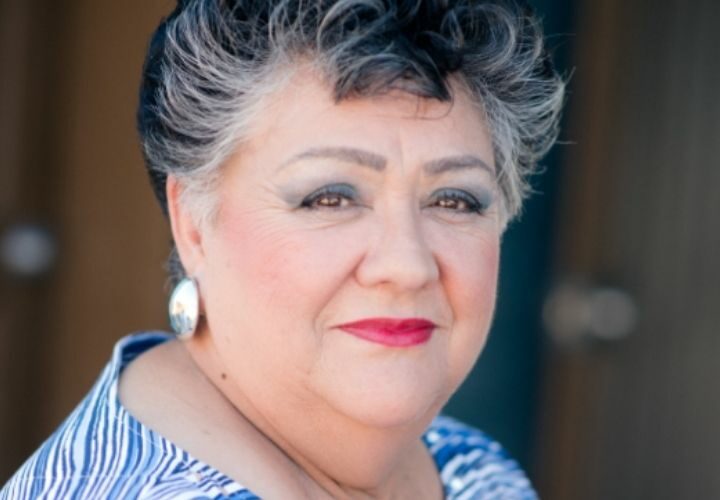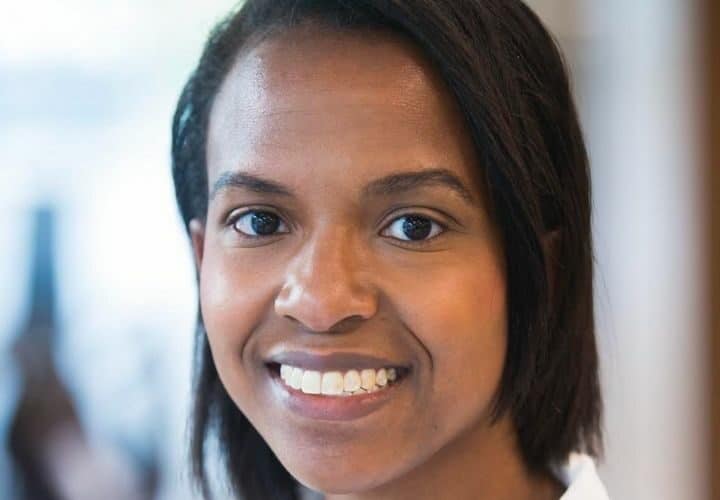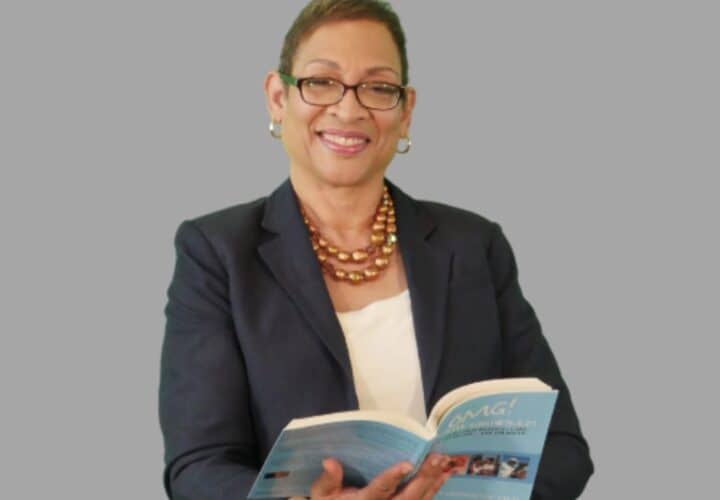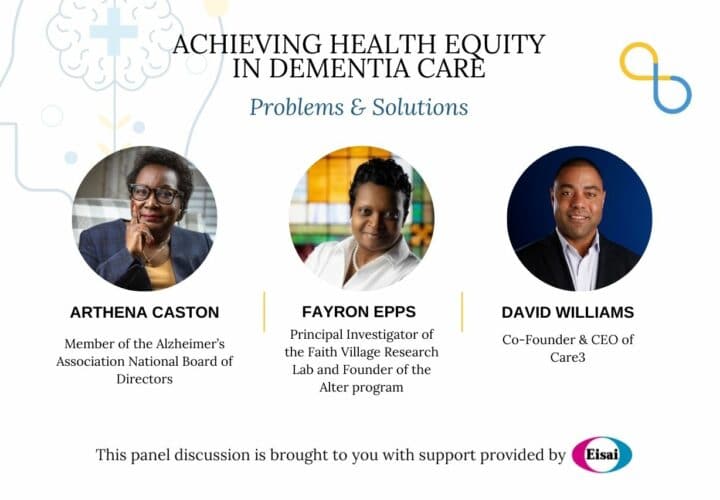Dementia research specialist Berta Carbajal shares her journey, from the most difficult day of her life to her career of building relationships in the Latino community.
This article is part of the series Diversity & Dementia, produced by Being Patient with support provided by Eisai.
Berta Carbajal remembers her mother as a happy, active and passionate person, a lover of music, family gatherings and traditional foods. These family customs were touchstones of Carbajal’s childhood, traditions that continue to play an integral role in her life. And today, all that Carbajal does in dementia research is dedicated to the memory of her mother, Sylvia Vasquez.
As a community health worker in dementia educational projects, Carbajal, a research specialist at Arizona State University’s Edson College of Nursing and Health Innovation, hopes that people living with the illness and their caregivers can be better prepared to manage the changes of dementia. In the Latino community, she said feelings of sadness, denial, fear and trauma surrounding dementia are common. With training and education, however, people can learn new strategies to cope, to preserve their wellbeing and understand that life isn’t over following a dementia diagnosis.
Nonetheless, Carbajal knows first-hand the challenges that accompany a diagnosis. During her mother’s journey with dementia, Carbajal, herself a mother of two, juggled caregiving, family responsibilities and a full-time job. It was a stressful time, Carbajal recalls, and she didn’t have access to the type of support that she and her colleagues now offer to families. But at the time, Carbajal was determined to care for her mother at home for as long as possible.
“I could not bear the thought of placing her in someone else’s care,” Carbajal told Being Patient. She added, “It got to a point where the day came towards the end that I had to place her in [what’s] probably considered a hospice now. That was the most difficult day of my life. I was wiped out for a long time afterwards. It was extremely difficult for me.”
Feelings of sadness, denial, fear and trauma surrounding
dementia are common. With training and education,
however, people can learn new strategies to cope, to
preserve their wellbeing and understand
that life isn’t over following a dementia diagnosis.
Vasquez was only 53 years old when she received her dementia diagnosis. Following multiple strokes, Vasquez, who had a history of diabetes and high blood pressure, started experiencing symptoms of dementia. She began repeating herself. Her personality changed. She had a hard time carrying conversations. Memory loss, confusion, anxiety and restlessness were all among her mother’s early symptoms of dementia, Carbajal noted.
“After the high blood pressure strokes, the dementia began to show its face,” Carbajal said. “It was very sad watching her disappear. To me, she was everything. She was my mother, my friend, my confidant.”
“It was very sad watching her disappear.
To me, she was everything. She was
my mother, my friend, my confidant.”
Because of her stroke, Vasquez had also lost her hearing, but even then, she would ask Carbajal and Carbajal’s husband to play her favorite Mexican folklore songs, like “Volver Volver,” “La Ley del Monte,” and “Cruz de Olvido” sang by the late Mexican singer Vicente Fernández.
“I used to sing with a knot in my throat because my heart would break for her,” Carbajal said. “She was still trying to hang in there by asking us to sing songs to her even though she couldn’t hear anymore.
“Music’s always been very, very important in our family, not just because we love the songs and what they represent, but they’re very healing as well.”
More than a decade after her mother’s death in 1995, Carbajal learned of a job opening in the team of the now-completed research project Momento Crucial, Spanish for “crucial moment,” led by David Coon of Arizona State University. The study gathered data on the needs of Mexican and Mexican American caregivers for those with dementia and other chronic diseases, and at that time, it was seeking a research specialist/community health worker — a “promotor de salud.”
This proved to be the perfect opportunity for Carbajal, who then was also a community health worker, educating and spreading awareness in the Latino community about cancer.
“When I read the job description and the target population [was] caregivers of loved ones, I said I’m applying for this in my mother’s memory,” she said.
Carbajal joined Momento Crucial’s research team. In her role, she visited families’ homes, interviewing people about all the stresses and positives of their caregiving experience. She connected with families, and because of her own experience both in public health and in caring for her mother, she understood what they were going through, Carbajal said. This experience and relatability, she added, was one key to Momento Crucial’s ability to make a positive impact.
“You are an individual that is very connected
to your community. You’re embedded in the
community and you’re a person that the community
trusts. They trust that you will not steer them wrong,
so to speak, that you will not give them
false information or mislead them.”
Over the past decade or so, Carbajal has continued to work alongside Coon and colleagues in studies focused on dementia care. For instance, the Early-Stage Partners in Care study is designed to train people with early-stage memory loss and their family caregivers with coping strategies. Another project, known as Care Partners Reaching Out, aims to educate and train care partners for people with dementia or memory loss. Further, the SmartCare: Technology and Smart Home Needs for Memory Problems project studies the impact of assistive technologies for people with cognitive impairment and their care partners.
In Banner Health’s podcast Dementia Untangled, Carbajal and Coon shared their insights into the perceptions of dementia among people in the Latino community, building connections with families, and the unique cultures and traditions within this community. Carbajal believes that educating the Latino community about the importance of research is critical. Some Latino families are wary of interacting with institutions like universities and the government, she said, but a better understanding of their needs can help researchers design programs for improving quality of life.
The promotores de Salud model, which relies on trusted individuals to educate their peers, is central to encouraging people from underrepresented communities to participate in research, she said.
“You are an individual that is very connected to your community,” Carbajal said of her role. “You’re embedded in the community and you’re a person that the community trusts. They trust that you will not steer them wrong, so to speak, that you will not give them false information or mislead them.”
For her research, advocacy and awareness work in the Latino community, Carbajal has received a number of awards, including the 2016 Dr. Joel Meister Outstanding Community Health Worker. She learned from the best, she said: her late mother and grandmother. “They were the go-to people in the community,” Carbajal noted. “They were always ready to offer a helping hand.”



